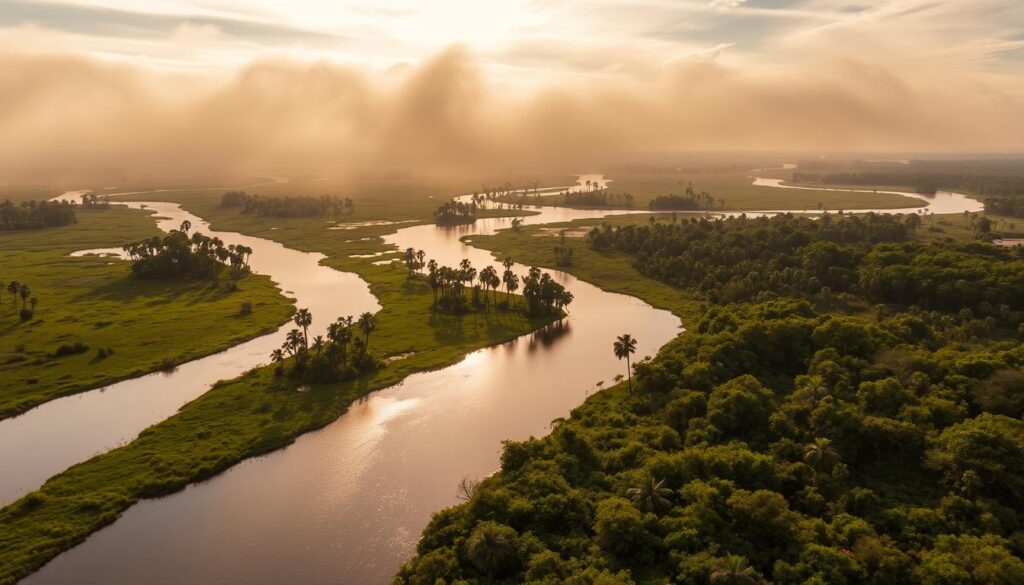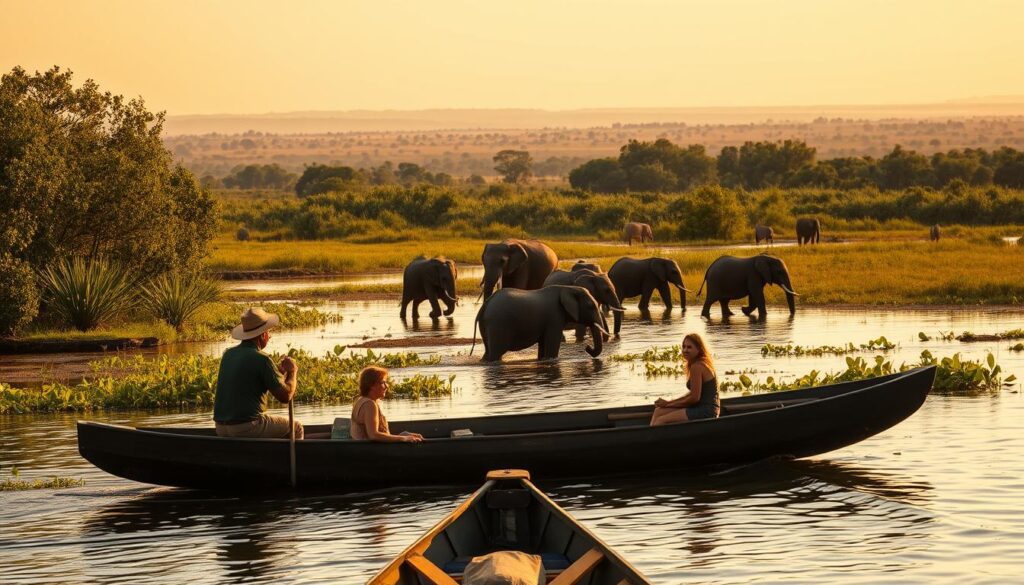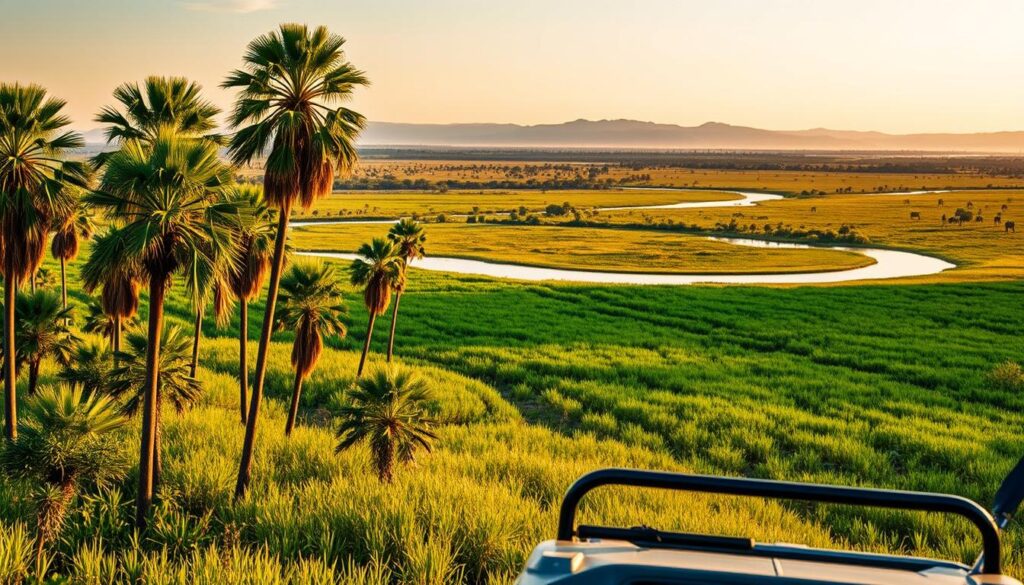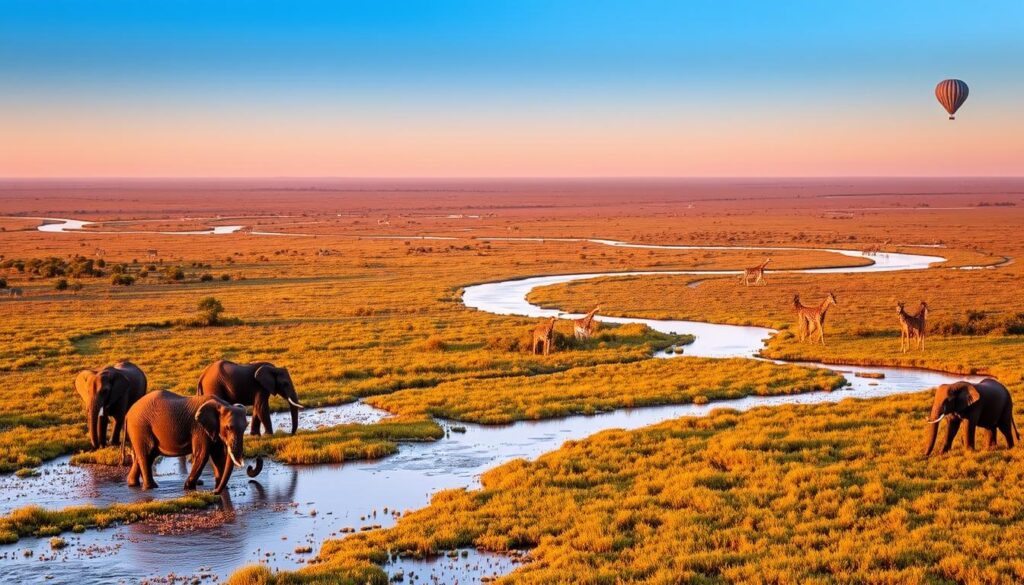Imagine yourself in the calm waters of an African delta. You’re surrounded by wildlife and greenery. Your Okavango Delta safari is ready, offering a journey through untouched nature.
Exploring this UNESCO World Heritage Site lets you see the delta’s beauty. You’ll have chances to see amazing wildlife. Whether you prefer a traditional botswana okavango delta safari or a custom okavango delta package, your trip is made just for you.
Key Takeaways
- Experience the unique charm of the Okavango Delta
- Encounter diverse wildlife in their natural habitat
- Choose from a range of safari styles to suit your preferences
- Explore the delta’s serene waters and lush vegetation
- Create lifelong memories in this pristine African wilderness
The Magic of the Okavango Delta: Africa’s Pristine Wilderness
In the heart of Africa, the Okavango Delta awaits. It’s a place of adventure and discovery. This area is not just a natural wonder but a home to many animals.
A Unique Ecosystem Unlike Any Other
The Okavango Delta has a complex network of waterways and islands. It’s home to a wide variety of wildlife, like elephants and crocodiles. The delta’s flooding brings water, supporting its rich life.
Exploring the Okavango Delta, you’ll see many animals. From okavango delta lions to graceful antelopes. Each species is important in this delicate ecosystem.
UNESCO World Heritage Site Status
The Okavango Delta is a UNESCO World Heritage Site. It’s known for its natural beauty and unique ecosystem. This status highlights its importance and the need to protect it.
Visiting the Okavango Delta is more than a safari. It’s a chance to see nature’s beauty. With its UNESCO World Heritage Site status, it promises an unforgettable journey.
Where is the Okavango Delta? Geography and Formation
The Okavango Delta is a natural wonder in Botswana, Africa. It’s a result of a complex geological history. This history has created its unique waterways and islands.
Location and Detailed Okavango Delta Map
The Okavango Delta is in northwest Botswana, about 620 miles north of Gaborone. A detailed Okavango Delta map is key to understanding its vastness. It shows the delta’s channels, islands, and lagoons.
Knowing the Okavango Delta’s geography is important for planning your safari. It’s one of the world’s largest inland deltas, covering about 5,791 square miles. Its unique layout supports a wide variety of wildlife habitats.
The Delta’s Formation and Annual Flood Cycles
The Okavango Delta’s formation is a fascinating story. It started around 40,000 years ago when the Okavango River flowed into the Kalahari Desert. The annual flood cycles are a key factor. These floods, peaking from June to August, bring nutrients that support the delta’s biodiversity.
The floods have been happening for thousands of years. They start in the Angolan highlands, where the Okavango River gets summer rain. As the waters flow, they deposit sediments and nutrients, enriching the soil and supporting vegetation. This cycle is vital for the delta’s ecosystem, affecting wildlife distribution and behavior.
| Month | Flood Level | Wildlife Activity |
|---|---|---|
| June | Peak Flood | High concentration of wildlife around water sources |
| August | Flood Subsiding | Predator activity increases as prey congregates |
| October | Low Water | Game viewing becomes easier as animals gather around remaining water sources |
Knowing the Okavango Delta weather is crucial for planning your visit. The delta has a semi-arid climate with hot summers and mild winters. The best time to visit is from May to October, when the weather is mild and game viewing is excellent.
Spectacular Wildlife During Your Okavango Delta Safari
As you explore the Okavango Delta, get ready to see amazing wildlife. The delta’s varied ecosystem is home to many animals. You’ll see the Big Five and other unique species found nowhere else.
The Big Five and Beyond
The Okavango Delta is known for its Big Five – lion, leopard, rhinoceros, elephant, and Cape buffalo. You’ll have great chances to see these iconic animals in their natural home. The delta also has cheetahs, hyenas, and many antelope species.
Okavango Delta Lions and Predator Behavior
The Okavango Delta is famous for its lion prides. You’ll get to see these majestic predators up close. Guides will share insights into lion behavior and other predators like leopards and cheetahs.
Okavango Delta Animals: Unique Species and Adaptations
The Okavango Delta’s unique environment has led to fascinating adaptations among its inhabitants. The delta is home to species like the sitatunga antelope, which has special hooves for the delta’s watery channels. Other unique species include the red lechwe and various bird species that thrive in the delta’s wetlands.
| Species | Adaptation | Habitat |
|---|---|---|
| Sitatunga Antelope | Specially adapted hooves | Watery channels |
| Red Lechwe | Long, pointed hooves | Wetlands and floodplains |
| African Elephant | Large ears for heat dissipation | Diverse habitats within the delta |
This diversity of wildlife, with expert guides, makes an Okavango Delta safari unforgettable. You’ll see predators in action and marvel at unique species. Your time in the Okavango Delta will be filled with wonder and excitement.
Best Time to Visit Okavango Delta for Ultimate Experiences

Planning your Okavango Delta safari means knowing the best times to go. The area changes with the seasons, offering unique experiences each time.
Peak Season: July to October
The peak season, from July to October, is the top choice for many. The weather is perfect, with clear skies and mild temperatures. It’s ideal for outdoor fun.
Advantages of Visiting During Peak Season:
- Comfortable weather for game drives and walking safaris
- Many wildlife sightings around water sources
- Great for photography with clear skies and golden light
But, it’s the busiest time, and popular spots can get crowded.
Green Season: November to March
The green season, from November to March, offers a different vibe. It’s known for lush landscapes and newborn animals. It’s perfect for those who love seeing the delta’s vibrant life.
Hidden Benefits of the Green Season:
- Beautiful, green landscapes for photography
- Unique wildlife viewing with newborn animals
- Fewer tourists for a more peaceful experience
Some areas might be hard to reach due to flooding. But, the green season has its own charm and rewards.
Okavango Delta Weather Patterns
Knowing the Okavango Delta’s weather is key for planning. It has a dry and wet season, each affecting activities and wildlife sightings.
The dry season, from April to October, has little rain and clear skies. The wet season brings rain and lush greenery. Planning around these can make your safari better.
Planning Implications:
- Check the weather forecast before your trip.
- Plan your activities based on the season.
- Be flexible with your travel dates for less crowded times.
Luxury and Adventure: Accommodation Options
The Okavango Delta has many luxurious and adventurous places to stay. Your choice of where to stay can really make your safari better. You can pick from water-based camps, land-based lodges, luxury safari camps, or budget-friendly mobile safaris.
Water-Based vs. Land-Based Camps
Water-based camps let you see the delta’s wildlife from your room or on mokoro canoe trips. Land-based camps are great for game drives and walking safaris, offering a classic safari feel. Choosing between them depends on what you prefer and what you want to see on your safari.
“The Okavango Delta is special because it mixes land and water,” says a safari guide. “Staying on the water or land, you’ll see the delta’s beauty and wonder up close.”
Chief’s Camp Okavango Delta: The Premier Safari Experience
Chief’s Camp Okavango Delta is perfect for a luxury and adventurous safari. It has high-end amenities and expert-guided tours. Guests enjoy comfy rooms, great food, and activities like game drives and mokoro trips.
- Luxurious tented accommodations
- Guided game drives and walking safaris
- Mokoro canoe excursions
- Fine dining and exceptional service
Budget-Friendly Alternatives and Mobile Safaris
For those on a budget, there are affordable options like mobile safaris. They offer flexibility and are cheaper. They might not be as fancy as luxury camps, but they give a real safari feel.
Think about what you want most: luxury, adventure, or both. The Okavango Delta has something for everyone, making your trip unforgettable.
Essential Okavango Delta Tours and Activities

Explore the Okavango Delta through its key tours and activities. These are perfect for every kind of adventurer. You’ll find a range of excursions that match different interests and preferences.
Traditional Mokoro Canoe Excursions
Experience the Okavango Delta’s calm waterways on a mokoro canoe. Local polers, who know the delta well, will guide you. This peaceful journey lets you see hippos, crocodiles, and many bird species up close.
Benefits of Mokoro Excursions: You’ll have close wildlife encounters, enjoy quiet boat rides, and learn about local traditions.
Game Drives and Walking Safaris with Expert Guides
For excitement, try game drives and walking safaris. These adventures let you see the Okavango Delta’s amazing wildlife. Guides will share interesting facts about animals and the ecosystem.
Highlights of Game Drives and Walking Safaris: You might see the Big Five, learn about predators, and discover unique species.
Helicopter and Light Aircraft Scenic Flights
See the Okavango Delta from above on a helicopter or light aircraft flight. These tours show the delta’s vastness, waterways, and the surrounding wilderness.
Advantages of Aerial Tours: Enjoy stunning views, learn about the delta’s geology, and appreciate its beauty from a new angle.
| Activity | Description | Best For |
|---|---|---|
| Mokoro Canoe Excursions | Serene navigation through delta waterways | Nature lovers, those seeking tranquility |
| Game Drives and Walking Safaris | Thrilling wildlife encounters | Adventure seekers, wildlife enthusiasts |
| Helicopter and Light Aircraft Flights | Aerial views of the delta’s landscape | Those seeking panoramic views, photographers |
How to Get to Okavango Delta and Practical Planning
Planning an Okavango Delta safari is exciting. It starts with booking flights to Botswana. You’ll land in Maun or Kasane, the main entry points.
International Flights and Local Connections
First, book flights to Botswana. Airlines like South African Airways and Kenya Airways fly to Gaborone or Maun. Then, take local flights or drives to the delta.
Many tour operators offer packages. Chief’s Camp Okavango Delta has everything from flights to accommodation. This makes your trip smooth from start to finish.
Maun vs. Kasane as Gateway Cities
Decide between Maun and Kasane based on your plans. Maun is better for Okavango Delta safaris with more flights and operators. Kasane is great for visiting Chobe National Park too.
| Gateway City | Primary Access | Ideal For |
|---|---|---|
| Maun | Charter flights to Okavango Delta | Okavango Delta safaris, scenic flights |
| Kasane | Road transfers or flights to Okavango Delta | Combining Okavango Delta with Chobe National Park visits |
Visa Requirements and Health Precautions
Know the visa rules and health tips before going. Some countries need a visa for Botswana. Check with the Botswana embassy.
Get vaccinated for yellow fever, hepatitis A, and typhoid. Malaria meds might be needed too. Talk to your doctor or a travel clinic.
Plan well for a great Okavango Delta safari. Book flights, arrange local transport, and take health precautions. You’re set for an amazing adventure.
Comprehensive Botswana Okavango Delta Safari Packages

Start your ultimate Botswana Okavango Delta safari with our top-notch packages. They’re designed to make your trip unforgettable. Whether you want luxury, adventure, or both, our Okavango Delta packages have you covered. They ensure a smooth and enriching experience.
Luxury Options
Experience luxury with our all-inclusive safari options. Enjoy the best accommodations, gourmet meals, and exclusive activities. Your Okavango Delta tour will be extraordinary, with services tailored just for you.
Our luxury safaris offer comfortable and stylish ways to see the Delta’s wilderness. You’ll go on guided game drives, mokoro canoe trips, and enjoy sunset cocktails by the water.
Combination Tours with Chobe and the Kalahari
Explore more with our combination tours. They take you beyond the Okavango Delta to other amazing parts of Botswana. See the Chobe National Park’s elephants and the Kalahari Desert’s unique landscapes and wildlife.
These combination tours give you a diverse and enriching experience. You’ll see different ecosystems and wildlife. From the lush Delta to the arid desert, your journey will be filled with unforgettable moments.
Self-Drive vs. Guided Tour Considerations
When planning your Botswana Okavango Delta safari, choose between self-drive or guided tours. Both have their benefits, depending on what you prefer.
Self-drive tours let you explore at your own pace. You can stop at scenic spots and take detours. Guided tours, on the other hand, offer expert guides. They can share insights on local wildlife, ecosystems, and culture.
The choice between self-drive and guided tours depends on your travel style. Whether you prefer independence or expert guidance, your safari will be unforgettable.
Cultural Immersion: Local Communities and Traditions
Start a journey that mixes safari thrills with cultural learning in the Okavango Delta. It’s not just about seeing amazing wildlife. It’s also about connecting with the local people who live here.
The Okavango Delta is a wildlife lover’s dream and a cultural gem. Communities here have kept their traditions alive for centuries. By meeting these communities, you learn about their heritage and today’s challenges.
The BaYei People and Their Mokoro Traditions
The BaYei people have a strong cultural bond with the Okavango Delta’s waters. They use traditional mokoro canoes to navigate the delta’s waterways. Cultural tours let you learn about their fishing, myths, and the delta’s role in their lives.
Cultural Tours and Authentic Village Experiences
Cultural tours let you visit real villages and see daily life and traditions. These tours are respectful and enriching, offering chances for meaningful interactions. You can learn crafts and share meals, gaining a true insight into their way of life.
Benefits of Cultural Tours:
- Direct interaction with local communities
- Opportunities to learn traditional skills and crafts
- Understanding of local customs and traditions
- Supporting local economies through responsible tourism
Supporting Community-Based Tourism Initiatives
Supporting community-based tourism helps local communities thrive. These initiatives make sure tourism benefits everyone fairly. This promotes sustainable development and protects the delta’s unique environment.
| Initiative | Description | Impact |
|---|---|---|
| Community-led Tours | Tours guided by local community members, sharing their knowledge and traditions. | Empowers local guides, promotes cultural exchange. |
| Craft Workshops | Hands-on workshops where visitors can learn traditional crafts. | Preserves traditional skills, generates income for local artisans. |
| Homestay Programs | Visitors stay with local families, experiencing daily life and sharing meals. | Fosters cultural understanding, supports local households. |
Joining these initiatives makes your Okavango Delta safari richer. It also helps protect this unique place and its people.
Conclusion: The Timeless Appeal of the Okavango Delta
The Okavango Delta leaves a lasting mark on your heart. After your safari, you’ll remember unforgettable moments.
This place is special because of its unique ecosystem, diverse wildlife, and rich culture.
Your visit helps protect this incredible natural treasure. It’s a journey of discovery and conservation.
Whether you choose traditional mokoro canoe rides or luxury safaris, there’s something for everyone. The Okavango Delta offers a variety of activities.
The memories from your Okavango Delta safari will stay with you forever. They’ll inspire you to come back to this magical place.
FAQ
What is the best time to visit the Okavango Delta?
The Okavango Delta is best visited from July to October for great weather and wildlife. From November to March, you’ll see lush landscapes and fewer people.
How do I get to the Okavango Delta?
First, fly to Maun or Kasane. Then, book local flights or road transfers to get there.
What are the accommodation options available in the Okavango Delta?
You can stay in water-based camps, luxury lodges, or budget options. Chief’s Camp Okavango Delta offers luxury and adventure.
What activities can I do in the Okavango Delta?
Enjoy mokoro canoe trips, game drives, walking safaris, and scenic flights. Pick what you like for your safari.
What is the significance of the Okavango Delta’s UNESCO World Heritage Site status?
Being a UNESCO World Heritage Site means the Okavango Delta is special. It shows the need to protect its environment and culture for the future.
Can I see the Big Five in the Okavango Delta?
Yes, you can see lions, leopards, elephants, buffalo, and rhinoceros in their natural home.
What is the okavango delta weather like?
Weather in the Okavango Delta changes with the seasons. July to October is cool and dry, while November to March is warm and green.
Are there any cultural experiences available in the Okavango Delta?
Yes, you can explore local culture through tours, village visits, and supporting community tourism. The BaYei people are known for their mokoro canoes.
What safari packages are available for the Okavango Delta?
Choose from luxury packages, tours with Chobe and Kalahari, or self-drive tours. There’s something for every budget and preference.
- Tinajani Canyon Peru: Ultimate Travel Guide to the Valley of Stone Giants, Elevation, Trails & FAQs
- Isla Suasi: The Complete Guide to Peru’s Private Lake Titicaca Island
- Ikara-Flinders Ranges — Complete Travel Guide for 2026
- Phillip Island, Victoria: Ultimate Travel Guide (Wildlife, Best Time to Visit & Insider Tips)
- Things to Do in Port Stephens – Best Attractions, Itineraries & Insider Tips

